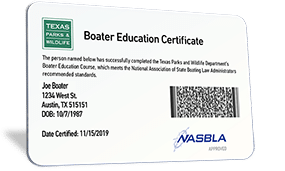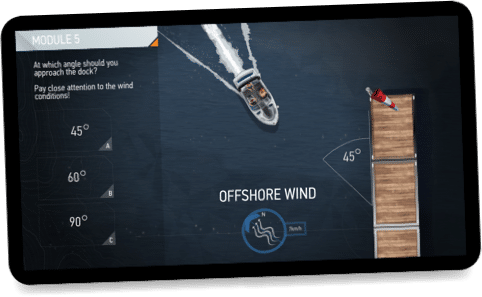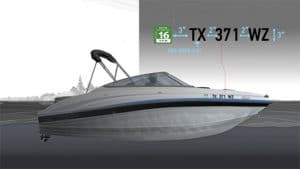
AGE REQUIREMENTS FOR TEXAS BOATERS
Boat operators in Texas, who are at least 13 years of age and who were born after September 1st,1993 may operate a boat without supervision, as long as they have successfully completed a Boater Education Course approved by the Texas Parks and Wildlife Department.
Excellent!


Official Texas boating course
The Texas BOATsmart! Boating Safety Course is approved and accredited by the Texas Parks and Wildlife Department. With more than 3,000 Five Star Reviews we’re proud to be recognized as an official Texas State Boating Course and the choice of boaters in Texas.


NASBLA & Coast Guard Approved
The BOATsmart! Texas Boating Safety Course is officially recognized by the United States Coast Guard as meeting the standards of the National Recreational Boating Safety Program. BOATsmart!’s online Texas Boating Safety Course is approved by the National Association of State Boating Law Administrators (NASBLA) as it meets and exceeds U.S. Boating Education Standards. NASBLA develops education standards for boating safety and represents boating law administrators in all 50 states and U.S. territories.

Watch, Listen & Learn
From anywhere, on any device at any time.
Our animated and narrated Boating Safety Course is perfect for all ages. Study from your Smartphone, Tablet or Desktop and switch between devices at any time. BOATsmart! automatically tracks your progress so you can study at your own pace.

Texas Boater Education Card Requirements
WHAT IS A TEXAS BOATER EDUCATION CERTIFICATE
A Texas Boater Education Certificate, commonly called a boating licence, proves that you’ve obtained the knowledge needed to safely operate a motorized boat on Texas’ waterways. All boat operators born after September 1st, 1993 are required to obtain a Texas Boater Education Certificate to legally operate a boat in Texas.
WHERE CAN I GET MY TEXAS BOATING LICENSE?
You can get your Texas Boater Education Certificate by completing the Official BOATsmart! Course online. Once you successfully complete the online study guide and final exam, you can print a temporary card immediately. Your permanent card will be available for download from the Texas Parks and Wildlife Department within 2 weeks.
HOW OLD DO I HAVE TO BE TO GET A BOATER CARD IN TEXAS?
You must be at least 13 years of age in order to complete a Texas state-approved Boater Education Course and get certified.
AGE AND HORSEPOWER RESTRICTIONS
Children under 13 years of age may operate a boat if they are supervised by a person who meets the following requirements:
- They are on board the boat while it is underway.
- They are legally able to operate the boat, if required.
- They are 18 years of age or older.
HOW LONG DOES IT TAKE TO GET MY BOATING LICENSE?
It takes a minimum of 3 hours to get your Texas Boater Education Certificate online. Once you’ve completed the online course and official test, you can print a temporary card and go boating right away. Your permanent card will be available for download from the Texas Parks and Wildlife Department within 2 weeks of completing your course.
CAN I GET REFRESHER LESSONS AFTER TAKING THE TEXAS BOATING COURSE?
Yes. It’s important to remember that boating regulations can change frequently. It’s important to keep up-to-date with your states boating regulations. Boaters can use the free BOATsmart! Knowledge Base, which covers everything you need to know about boating in Texas, including boating equipment requirements, navigation and right-of-way regulations and restrictions that may apply on Texas waterways.
DO I NEED A LICENSE TO RENT A BOAT IN TEXAS?
It is highly recommended that all boat operators obtain a Texas Boating Education Certificate before operating any vessel. Completing a boater education course and obtaining your certification will ensure that you’re confident and safe on the water.
Boating and alcohol in Texas
TEXAS BOATING AND ALCOHOL LAWS
It is illegal to operate any boat (including boats, personal watercraft (PWCs), waterskis, sailboats, sailboards or other similar devices) while under the influence of an impairing substance, such as alcohol or drugs.
In Texas, a person is considered to be intoxicated if they:
- Have a Blood Alcohol Concentration (BAC) level of 0.08 or higher.
PENALTIES FOR DRINKING AND BOATING
In Texas, a person convicted of boating under the influence will be subject to the following penalties:
First conviction:
- A fine of up to $2,000 and/or;
- Imprisonment for up to 180 days.
Second conviction:
- A fine of up to $4,000 and/or;
- Imprisonment for up to 1 year.
Third conviction:
- A fine of up to $10,000 and/or ;
- Imprisonment from 2-10 years.
Texas Boating Age Requirements

UNDER 13 YEARS OF AGE
Children under 13 years of age may operate a boat if they are supervised by a person who meets the following requirements:
- They are on board the boat while it is underway.
- They are legally able to operate the boat, if required.
- They are 18 years of age or older.

Texas's Boating Fines

Operating under the influence
Up to $10,000

Failure to carry Texas Boater Education Certificate
Up to $500

Kill-switch law violations
Up to $200

Illegal Transport of Aquatic Invasive Species
Up to $500

Life jacket violations
Up to $500
General Texas boating FAQs
WHO REGULATES BOATING LAWS IN TEXAS?
The Texas Parks and Wildlife Department is responsible for regulating boating laws in the state of Texas.
Boating Emergencies:
Call 911 to report a boating emergency in Texas
WHO ENFORCES TEXAS BOATING LAWS?
Boating laws in Texas are enforced by:
- Texas Parks and Wildlife Law Enforcement Division.
- Game Wardens.
- Marine Safety Enforcement Officers.
- The Coast Guard (on federal waters).
Law enforcement in the state of Texas have the authority to stop and board a boat to ensure they are in compliance with state and federal laws.

How to register a boat in Texas
TEXAS BOAT REGISTRATION
To legally operate a boat, on public waters, in the state of Texas, you must obtain a Texas Certificate of Number and validation decals.
Once a boat has been registered, the owner will be provided with a Texas Certificate of Number and validation decals. The Certificate of Number must be carried on board the boat at all times during operation and must be available for inspection by law enforcement.
A Texas Certificate of Number can be obtained by submitting the required titles, applications and fees (in person or by mail) to the Texas Department of Parks and Wildlife. Certificates of Number are valid for 2 years. Boat owners will receive a renewal notice 3 months prior to the expiration of the certificate.
THESE VESSELS DO NOT REQUIRE REGISTRATION IN TEXAS
- Human-powered craft such as canoes, kayaks, punts, rowboats, or rubber rafts (regardless of length).
- Wind-powered sailboats under 14 feet in length.
- Boats that have been registered in another state that are using Texas waterways for 90 consecutive days or less.
BUYING OR SELLING A BOAT IN TEXAS
The rules for buying or selling a boat in the state of Texas may vary depending on if the boat is new or used. Be sure that you’re familiar with all of the regulations that apply if you are buying or selling a boat within the state of Texas. For more information on Texas regulations for buying or selling a boat, visit https://tpwd.texas.gov/fishboat/boat/owner/buying_and_selling/
DO I NEED BOAT INSURANCE IN TEXAS?
Boats in Texas are not required to be insured, however it is recommended.

Owners of boats in Texas must ensure that their registration number and decals are properly displayed on their boat.
Registration Number and Decal Placement in Texas:
- The numbers must be painted or permanently affixed to each side of the boat’s bow (boat owners are not permitted to display any other numbers in this area).
- The numbers must be read from left to right.
- The registration number must be in block letters that are at least 3 inches high, and in a color that contrasts with the color of the boat.
- The letters or numbers of the registration number must be separated from the letters by a hyphen or by an equivalent space.
- Validation decals must be affixed to each side of the boat, in line with the registration number and 3 inches toward the stern.
- The placement requirements also apply to personal watercraft (PWCs).
Texas lifejacket laws
All boats, including human-powered craft, must be equipped with one Type I, II, III or V wearable life jacket for each person on board. A Type V life jacket is only acceptable if it is used in accordance with the specific label instructions.

Boats more than 16 ft in length
Vessels 16 feet in length or longer must, in addition, carry one Coast Guard-approved Type IV throwable device on board (this requirement does not apply to canoes and kayaks)

13 Years of age & Younger
All boaters and passengers under 13 years of age are required to wear a wearable life jacket at all times while on any boat that is underway.
Personal watercraft laws & regulations
DO I NEED A BOATER EDUCATION CERTIFICATE?
Operators of PWCs in the state of Texas are required to follow the same rules and regulations that apply to all motorized boat operators. Operators of PWCs are required to obtain and carry a Texas Boater Education Certificate in order to legally operate a PWC within the state.
HOURS OF OPERATION
It is illegal to operate a PWC at night in the state of Texas. PWCs may legally be operated from sunset to sunrise.
AGE REQUIREMENTS
Children who are under 13 years of age are prohibited from operating a PWC unless accompanied onboard by a person who is at least 18 years of age and who can lawfully operate the vessel.
TEXAS PWC REGULATIONS
It is illegal in the state of Texas for any person to:
- Operate a PWC at night
- Operate a PWC within 50 feet of another PWC, boat, or person unless they operate at slow or idle speed
- Jump the wake of another vessel recklessly, or while unnecessarily close to the other boat
Environmental Protection
NON-NATIVE AQUATIC SPECIES
In the state of Texas, it is illegal to possess or transport any exotic aquatic plant or animal listed as harmful or potentially harmful (an Aquatic Nuisance Species). This includes:
- Plants such as hydrilla, water hyacinth, and giant salvinia
- Fishes such as tilapia and Asian carps (grass, silver and bighead carp)
- Zebra mussels
Additionally, boaters in Texas are required to immediately remove and dispose of any harmful aquatic plant that is clinging or attached to their boat, motor vehicle, or other device used to transport or launch a boat. Illegal transport can result in a fine of $25-$500.
Help Prevent the Spread of non-native species
Unfortunately, Aquatic Nuisance Species (ANS) spread easily from one body of water to the next, which is why Texas recently enacted the following boating laws:
- Persons leaving or approaching public fresh water are required to drain all water from their vessels and on-board receptacles
- Live fish, including personally caught live bait, cannot be transported from the water body where the fish were caught in or aboard a vessel in water from the water body where the fish were caught.
Infestations of non-native species
Report new infestations of non-native aquatic species to the U.S. Fish and Wildlife Service at (209) 946-6400.
Invasive Species
Sighting of Aquatic Invasive Species can also be reported online at https://www.texasinvasives.org/
Lone Star State, Blue Waters, Good Times

Texas Boating Destinations
They say everything is bigger in Texas and this old saying truly holds ground when it comes to the epic outdoor activities of the Lone Star State. So will you take advantage of the over 100 lakes and hundreds of miles of coastal shoreline while you’re here? Maybe rip up a lake on a Jet Ski? Skim along a quiet river in your kayak? Land a wakeboard trick and catch the action with your GoPro camera? Whatever your watersport of choice, you’ll have no trouble finding a spectacular waterway to enjoy in Texas!
So, will you be visiting a big city like Dallas or Houston? Or San Antonio’s riverwalk, on the banks of the San Antonio River? Or maybe you’ll be heading to the coast to check out the the crystal blue gulf waters of Rockport or South Padre Island? How about coastal Corpus Christi, known as the ‘Sparkling City By The Bay’, with it’s beautiful beaches? Truth is, it doesn’t really matter where you’ll be in Texas, you’re sure to find something awesome to do there!

